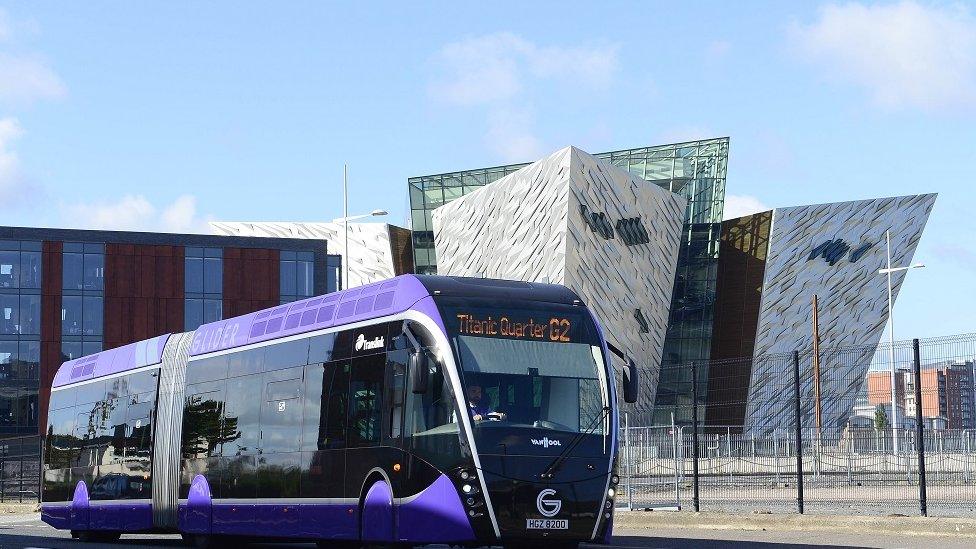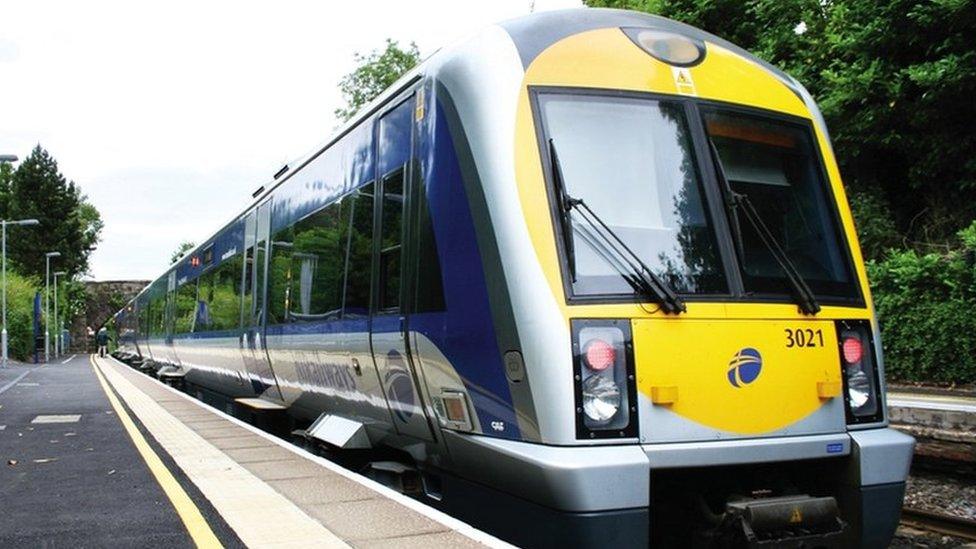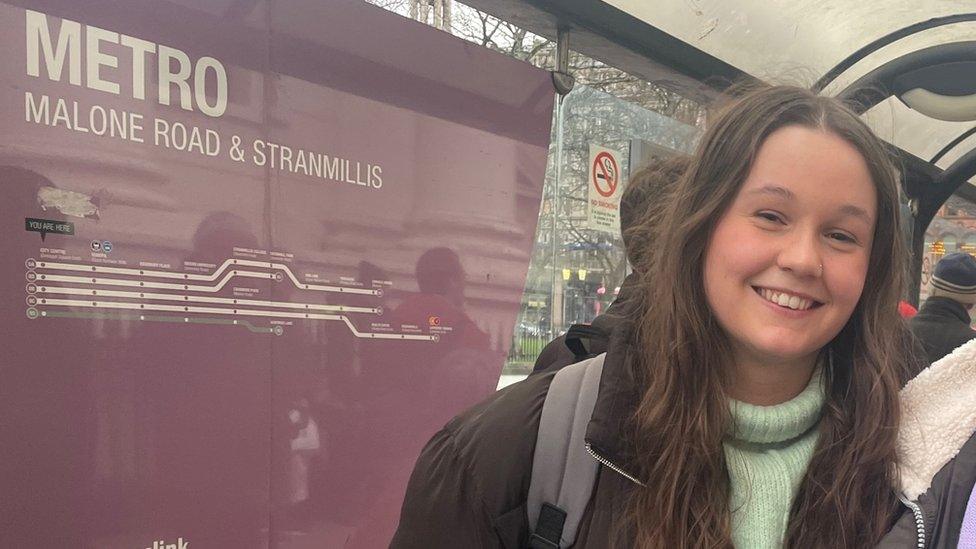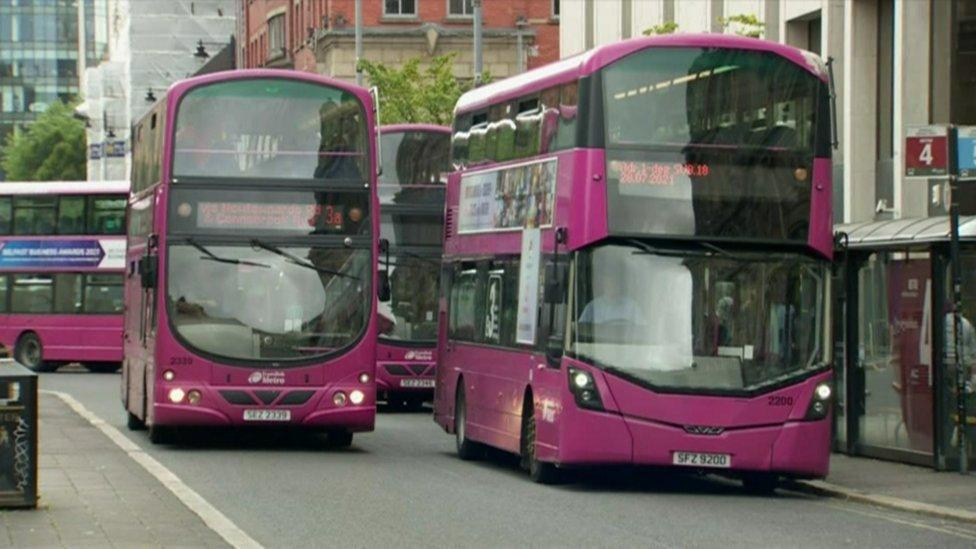Bus and train fares being raised by Translink by 7%
- Published

Fares have remained frozen for almost the last four years
Translink fares are to increase by approximately 7% from 6 March, the Department for Infrastructure (DfI) has said.
The rise will affect public travel on Metro, Glider, NI Railways, Enterprise, Goldliner and Ulsterbus services.
Prices have remained frozen for about four years as a response to the cost of living crisis.
Translink said the fare review had been requested by DfI because of pressures on their budget allocations.
A spokesperson for the department said: "The secretary of state for Northern Ireland stated that steps would need to be taken to improve Translink's sustainability through the uprating of public transport fares.
"The department fully recognises the challenges facing many people in the current cost of living crisis.
"However, significant budget pressures mean the below inflation uplift is needed to maintain and improve public transport services."
Northern Ireland Office Minister Steve Baker has already warned Stormont's budget will be "very difficult" next year as legislation allowing the UK government to pass a budget for NI is being fast-tracked at Westminster.
The budget, external sets out spending allocated to Stormont's nine departments for this financial year.
They have been operating without proper budgets since the start of the financial year in April due to the collapse of the executive.

The price hike will be felt across all Translink services
Translink's Group chief executive Chris Conway said: "We understand this will add to the cost of living pressures our passengers are already facing, however we have worked very hard to keep fare adjustments low and, indeed, having had no fare increase in four years, in real terms our fares still offer good value.
"We know any increase is unwelcome, but we are confident that bus and train travel is still an attractive and competitive option, compared to private motoring particularly given the cost of fuel.
"It is also the heathier, smarter and cleaner travel choice for a better-connected society."
'A difficult burden'
In Belfast city centre on Wednesday, commuters had mixed reactions to Translink's announcement.
In real terms, a £4.20 cash day ticket - allowing unlimited travel across the city's bus networks - is expected to rise to approximately £4.50.
Discounts can be made online where an off-peak (after 09:30 GMT) day ticket currently costs £3.00.

Ciara Kelly, left, says she has no option but to pay higher fares as she leaves Londonderry during on-peak hours
"We were chatting about this on our lunch break... it's ridiculous," said Ciara Kelly from Londonderry.
She is part of a group of student health visitors, required to commute twice a week from Derry to Belfast at the cost of £19.50 for each return trip.
This is now expected to rise to approximately £20.85 - a weekly increase of £2.70.
In 2022, their tickets were slightly cheaper because they were able to travel off peak, but now by travelling at 06:10 GMT they face on-peak surcharges.
"Because we're out doing our training, we can't say no, we have to get up, we don't drive up because of where the university's located and it's difficult for parking," she said.
She feels prices should have remained frozen, "especially at the minute because everything's going up",
Dermot Charles, a 90-year-old from Belfast, agreed.
He considers himself "very fortunate to be retired and to avail of a bus pass" as the current cost of living crisis continues.
"It'll be a difficult burden for a lot of people who are going back and forward to work having to pay their fare," he said.

Lucy Pattison said although the increase may be small "it all adds up"
Lucy Pattison is studying in Belfast and regularly uses the city's bus network to get around.
"It's not good, we're students and can't afford it," she said.
"To be fair, the day ticket isn't a bad price, it's £2.80 with student discount. It might only be going up 20p or so but it's still expensive because it all adds up.
"I suppose everything's going up but it's not the sort of thing you want, using it everyday."
Related topics
- Published23 January 2023

- Published25 October 2022
